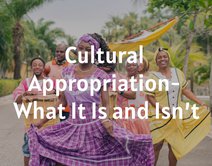Find out what cultural appropriation is, why it is wrong and how to enjoy, learn about, and appreciate other cultures without misappropriating them.
The culture we belong to helps to decide a lot about the way we are. There was a time when a lot of people had no exposure to other people and other cultures. Today, more people belong to diverse communities and have the pleasure of experiencing cultures other than just their own. Sharing and learning about other cultures is a lot of fun, but some people take it too far and misappropriate other people’s cultures. Join Mysticsense to learn some cultural appropriation examples, and why we shouldn’t engage in it. Find out the difference between appropriation and cultural appreciation and learn what cultural exchange is and how to make that happen.
What is Culture?
Culture includes our behavior, structures, taboos, and norms found in our society. That also includes the art and music, beliefs, habits, customs, laws, and knowledge that is embraced by the cultural group that we belong to. Culture typically springs up at a specific location in the world. We are taught our culture by our society and family. The way that we use technology, dress, the type of homes that we live in, and the way that we acquire material possessions all have to do with what culture we were brought up in. Our politics, philosophy, beliefs and views about science, and religion all have to do with the culture that we belong to.
While we all belong to a greater culture, many of us belong to subcultures also. Subcultures are smaller cultural groups within a larger cultural group. For example, in the United States, some people are called “earthies” and they are known for being very serious about environmentalism and living in touch with nature. Another cultural group in the United states is the Gullah Geechee people who live around the Carolinas, Florida, and Georgia and they are descendants of enslaved African people whose family settled in that region. People in subcultures have their own distinctive food ways, art, music, dress, and beliefs.
Our culture will shape our perception and how we interpret the world. This will shape our beliefs which influences our decisions. It decides what we value, and what we think of as unimportant. Our culture helps to decide what type of education we get as well as how much of it we get. Our culture fluences what type of family members we will be and how we treat our children. It even influences our views on health and mental health. Our culture is a big deciding factor in creating who we are, how we behave, and therefore what type of life we will live. Even though we all have our own cultures, some things are universal- like the Golden Rule. You can read about that here; Are Golden Rule Truths Universal Teachings?
What is Cultural Appropriation?

It's fair to say that we are all born into a culture, and not everybody leaves their culture. A lot of people leave their culture because of things that they disagree with. Religious and political beliefs often shape whether people leave a culture. Some people are perfectly happy with their own culture, but they see another culture that they admire. Instead of appreciating the culture, sometimes they will steal things from that culture and behave as if it's their own culture.
This is especially true for people in a dominant culture stealing things from a minority culture. This is called cultural appropriation, or cultural misappropriation. Cultural misappropriation specifically takes traditions or intellectual property from other cultures without permission. Quite often exploitation happens, and the minority group whose culture is misappropriated has been exploited or oppressed in other ways. Sacred items, sensitive cultural things like meaningful clothing, and art styles are often misappropriated.
Clothing
One example of misappropriation of clothing is the use of feathers improperly in fashion. Multiple Native American tribes all over North America view feathers as sacred. Some tribes award a feather to someone for especially good work, bravery, or leadership. Some men specifically acquire so many feathers they can construct something that white Americans call a “war bonnet". War bonnets are often worn by non-native females as a fashion statement. “War bonnets” were not created for any other purpose except the sacred and only for men. Non Native Americans wearing fake “war bonnets” is cultural misappropriation. Read about the spiritual meaning and symbolism of birds here: What Do Different Birds Symbolize?
Religion
Some religions are based on ancestor veneration. Yet some people don't mind using practices from those religions even if they don't have that type of ancestry. Is it a matter of feeling called, or is it cultural appropriation? It's a hot debate topic. Most religions share certain elements. For example, most religions burn incense for sacred purposes, but the word “ smudging” comes from Native American practice. So can you smudge if you don't practice a Native American religion? Some people say that you cannot, and to claim that you are, or to try to copy practices from a religion that you don't belong to is cultural misappropriation. You can use incense no matter what religion you practice and you can read more about the best incense for you here: Your Best Incenses
Art
Surprisingly, one way artwork has been misappropriated is because of sex. Throughout history there have been multiple women whose art has been stolen by men. Famous artist Auguste Rodin had a student, and lover named Camille Claudel. Denied formal education because she was female, Claudel became Rodin’s student. It became obvious however, that she did much of the work on the art that he got full credit for. Architect and designer Frank Lloyd Wright was also guilty of this. He took the credit for a lot of his employees' work, most especially Marion Mahony Griffin, whose designs and drawings helped make Wright famous. You can read more about that here: Stealing Art: When Men Took Credit for Women’s Work - Artland Magazine
Why Cultural Appropriation is Bad

Cultural appropriation is never a good thing. Cultural misappropriation typically entertains or exploits for profit someone else's culture. It disregards the culture that you belong to and disrespects the culture of the people who you're misappropriating from. It creates an artificial image of someone who you're not and it perpetuates stereotypes.
It Disregards Your Culture
You grew up in a culture. There's a lot of beauty in that. The way that your family did rites of passage, and the way that they dressed you and fed you growing up is a big part of your culture. The values that they instilled in you are part of that too. Nobody's family is perfect, and as you grew up you may have seen things that you disagreed with. So as an adult, you choose things from other cultures that appeal to you. You may vote differently than your family, and you may eat more healthfully than they do. That's fine. Doing something like faking an accent to make it sound like you came from another region then you're from disregards the culture that you have. Respect and embrace your own culture instead of appropriating other people’s.
Disrespects Their Culture
Misappropriation is deeply disrespectful. Not only does it steal from a culture, it also portrays those people wrong. One example of cultural misappropriation is “sexy” Halloween costumes of Native American men and women. “Shirtless Braves” and “Sexy Maidens” in skimpy clothing sexualizes an entire culture of people, and objectifies them. Sports mascots of racial groups is another form of this. People's cultures are not a sports mascot or a Halloween costume. It's who they are and should be respected. Harmonizing is important, and you can even harmonize with people who you dislike. Read how here: How to Harmonize with People You Don’t Like
You Impersonate Someone You’re Not
Prominent news stories have circulated about people saying they're going to change their race based on the way that they dress, talk, and new names that they give themselves. You cannot wear makeup, wigs, or dye your hair and suddenly become another race because of it. You are impersonating people from other cultures when you pretend to belong to cultures that you don't. Impersonation for theater or drama is acting. Impersonation in your real life is disrespectful and means that you are not genuine. Read about one side of yourself you may not be embracing, your shadow side here: The Unconscious Self: Embracing the Dark Side
It Spreads Stereotypes
Cultural misappropriation helps to perpetuate harmful stereotypes. African Americans are often penalized for wearing their hair and braids and cornrows. They're sent home from school and accused of looking unprofessional on the job with these hairstyles. Non-African American celebrities and models are often praised for being “brave” or “fierce” for wearing these styles. The traditional hairstyle for some people shouldn't be a fashion statement for other people. If you cultivate stereotypes, you need redemption from that. You can read about redeeming yourself here: Deliverance - Do We Need to be Redeemed?
Cultural Appreciation
So, does that mean that we have to stay completely away from other people's cultures? Of course not. It just means that we have to be respectful. Cultural appreciation is one way to do that. Cultural appreciation is partaking of or admiring a culture without exploiting it. Without cultural appreciation, we would never listen to music from a different culture, enjoy art from a different culture, or even eat food from a different culture. That would be a shame. Cultural appreciation is very important and helps us to learn about other people.
Cultural practices have developed over time due to what's available. With food especially, available local ingredients will dictate the cuisine. Art can be influenced by the natural landscape and the natural resources that can be used for creating art. Clothing, too, is dictated by climate, available materials to make clothes with, and necessity. Recreation is also a part of culture. Skiing developed places where there was snow. Surfing developed places where there was the ocean and waves. Those things became a big part of the culture.
Examples of cultural appreciation include attending cultural festivals or events. Trying new food and cooking techniques is also cultural appreciation. Learning to pronounce the names that people have from other cultures is an extremely important part of cultural appreciation. To prepare to go someplace and appreciate another culture, do a little research before you go. Ask people you know who are part of that culture about conduct and what to expect. Sometimes you can find articles online like this one: Advice For First Time Pow Wow Visitors From Pow Wow Dancers and Singers - PowWows.com
Cultural Exchange

We can enjoy other cultures and share our own. The way we do that is through cultural exchange. Cultural exchange it's just sharing culture with people who are from a different culture than yours. It's fun, and it's easy. Three simple ways to do that is to be open to learning, go as a respectful guest to partake, and reciprocate by welcoming other people to learn about your culture.
Learn
There are lots of opportunities to learn about other cultures. Visiting museums can teach you history as well as what modern people within other cultures do. Travel will teach you about other cultures. Eating food from other cultures will teach you a lot. Talking to people from other cultures and asking them to explain to you how and why they do things differently than you fosters understanding. It will show you that we are more alike than we are different, and you can make some good friends. You will learn wonderful things worth remembering and you can learn the power of memory here: The Mysterious Power of Memories
Partake as a Guest
To enjoy other cultures, go in as a respectful guest. Ask what etiquette is polite and ask what you should do as well as what you should not do when you are going someplace as a guest. There is an old saying that goes, “When in Rome, do as the Romans do.” This doesn't mean that you are changing who you are or the way that you live your life, it just means that you're being polite to your hosts who are kind enough to share their culture with you. Some people would say that members of other cultures are foreign, or aliens. That's not the only kind of aliens there are, and you can read about outer space aliens here: Is There Alien Life in the Universe?
Reciprocate
It's a wonderful feeling to be invited as a guest to enjoy cultural exchange. Make sure to invite your hosts to learn about your culture too. Extend all the same courtesies to them the first time they are exposed to your culture that you would want them to extend to you. Make sure they understand what's happening, and don't be offended if they ask any questions. Cultural exchange means exchange. You will share as well as partake, and you will both feel welcomed and enlightened. This will create an experience that you can all be grateful for. Read about having an attitude of gratitude here: Learning to Have a Grateful Heart
Culture is beautiful. It decides a lot about who we are and our sense of identity. It helps us to connect with people, and it helps us tell other people about ourselves. Culture changes when we share with people from other cultures, and that tends to happen gradually. Completely remaking the way you talk, dress, and create because you like another cultural group is one way to misappropriate culture, and nobody likes their culture misappropriated. So, be who you are, and share the beautiful things from your culture while you learn about other people. After all, we might be different, but we are citizens of the same world, and we are more alike than different from one another.
Do you need advice about another culture or to speak with your own ancestors about your family culture? Get a reading started today!
We have selected the most relevant psychics for this article, you can connect with any of them and get accurate advice on this subject.









